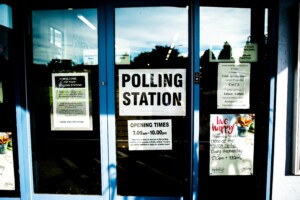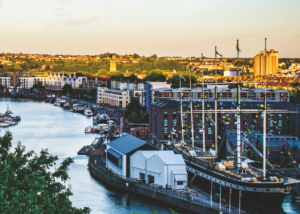Boosting Social Mobility and Opportunities Should Be the Key Topics in the Referendum Karl Brown

Share this
Karl Brown FRSA is a Commercial Property Partner at Clarke Willmott, specialising in the acquisition and disposal of development land. He is the inaugural chair of Clarke Willmott’s Equality, Diversity and Inclusion Group. In 2019 he founded and launched the Bristol Property Inclusion Charter, the first city property inclusion charter in the UK. He is a social mobility ambassador for the Law Society. This article is written in a personal capacity.
The article is part of Bristol Ideas’ Referendum 2022 debate which looks at all aspects of city governance as part of ongoing work on democracy and the forthcoming May 2022 referendum.
Michelle Obama, in one of her many famous speeches, said, ‘When you’ve worked hard, and done well, and walked through that doorway of opportunity, you do not slam it shut behind you. You reach back, and you give other folks the same chances that helped you succeed.’ The sentiment expressed by Obama is my ethos in life and one I have tried to implement in my home city of Bristol. In my mind, the key factor in the choice between the mayoral and cabinet model and the committee model has to be which model best enhances the doorways of opportunity for our many different communities in Bristol.
I am a Commercial Property Partner in the Bristol office of a national law firm. I am proud to not only be Bristol born and bred but also very proud of my Jamaican heritage. My parents came to the UK from Jamaica in the early 1960s. My dad was a plasterer and my mum was a nurse. Their example gave me not only a good work ethic but also a desire to make positive change by boosting social mobility and diversity in our professions.
Bristol is a fantastic, thriving city which not only regularly makes a strong contribution to the UK economy and wealth but also regularly attracts plaudits in national and international press as one of the best cities to live in the UK. But alongside these strengths it is well known that Bristol is also a city where there are big differences in opportunities for our communities, especially between the north and south of our city. There have been numerous education and public health reports and statistics which have highlighted the stark divides. Whilst I would not question the sincerity of those involved in the pre-mayoral governance system in Bristol to improve this position, it is likely that some of the factors that led people to vote to have the mayoral model in Bristol was a desire for high profile and more visible leadership and, more importantly, the chance for concrete changes in their lives and local communities.
If we are to extend the ladders of opportunity from our thriving economy to all communities in Bristol then a key factor must be collaboration between our public governance, the business sector, and organisations in the third sector such as charities. I have been fortunate to have had opportunities to give back to Bristol through previous roles – I was Chair of Education and Skills at local business group the Bristol Junior Chamber (BJC), which involved running a mock interview scheme at local schools, and in 2014 I became the first ever Black president in the then 66-year history of the BJC. It is through these roles that I was offered the opportunity by our first elected mayor of Bristol to be a founder board member of the Bristol Learning City Partnership Board in 2015. This board was part of Bristol becoming the first learning city in England and was created to promote partnership between city governance leaders, those working in in our local schools, colleges and universities and the business community to formulate initiatives and policies to help drive learning opportunities for the young and adults in all our communities.
When I was a member of the Bristol Learning City Partnership Board I felt able to put forward my perspective not only as a child of immigrants but also as a business leader, and highlight the particular ways I felt Bristol businesses could best assist and reach out to communities to boost learning and employment. There is no question in my mind that the visibility and high-profile nature of the Bristol mayoral role and the respective Cabinet Member for Education assisted in the recruitment of founder members of the Bristol Learning City Partnership Board. I would add that whilst on the Bristol Learning City Partnership Board I worked not only with both our elected mayors but also with different people who held the role of Cabinet Member for Education (both Labour and Conservative), and the key point was collaboration to try to make Bristol a better city. The emphasis on collaboration between our different sectors has continued to be a key focus and strength of our mayoral model of governance through the Bristol One City Plan and I know various people from our business and third sectors who have felt empowered by being able to play a strong role in helping Bristol alongside our city governance.
It is vital that Bristol has a governance model which gives strong visibility and profile for Bristol, provides an accountable and clear focus point for local people, and promotes and enhances collaboration between our different sectors. I believe these factors best boost opportunities for our local communities and more social mobility and this is why in a personal capacity I favour the current mayoral model of governance.
Find out more about Bristol Ideas’ Referendum 2022 debate. Copyright of articles remains with the authors.


